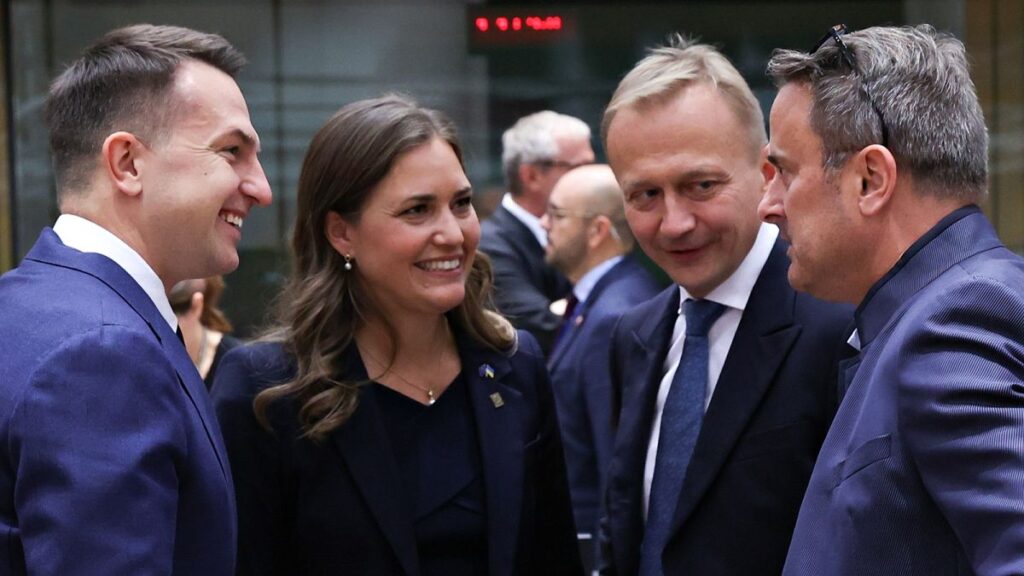The political battle over Ursula von der Leyen’s proposed €2 trillion budget for the European Union began in earnest on Friday as ministers for European affairs met in Brussels, with initial criticism focused on the size of the ambitious proposal.
Von der Leyen’s plan, unveiled on Wenesday after weeks of mounting speculation, will require unanimity from the 27 member states. The president of the European Commission called it the “most ambitious” budget ever presented.
“No country is ready to accept the budget as it is today,” said Marie Bjerre, Denmark’s minister, at the end of the meeting. As the rotating presidency of the EU Council, Denmark will steer the debate until the end of the year.
“This is a long discussion we will have, and obviously, there are different views on how to structure the budget, and it will also be difficult. But Europe needs a budget,” she said.
Long-standing tensions between fiscally conservative countries such as Austria, Finland, Sweden and the Netherlands, and more indebted southern nations, like Spain and France, resurfaced on Friday, offering a preview of the squabble to come.
Finland’s Minister for European Affairs, Joakim Strand, argued the budget level — which has increased from 1.13% of the EU’s GNI to 1.26% — was “too high” and must be slashed. The Commission says the figure is 1.15% after subtracting 0.11% from the €168 billion needed to repay the COVID-era debt between 2028 and 2034.
Austria’s Claudia Plakolm, whose country joined the Frugal Four in the 2020 talks, said the proposed budget was “very, very far” from a position she could endorse.
“We called for the careful and wise use of Europeans’ tax money, and this draft is neither more careful nor wise,” she said. “We find the volume of the EU budget excessive.”
Her Polish counterpart, Adam Szlapka, praised von der Leyen’s proposal for its ambition and scope, but cautioned: “We still need some discussion about it, especially in terms of cohesion and common agricultural policy.”
Agricultural subsidies and cohesion funds — aimed at narrowing the socio-economic gap between the richest and poorest regions — have been merged into a larger pot, with important changes in how they are managed and distributed, as Euronews reported.
Spain’s Fernando Sampedro voiced a discordant note, saying the €2 trillion size “does not measure up to the challenges” facing the bloc.
“We appreciate that security and defence are treated as a European public good that requires a strong response from the Union, but this should not be at the expense of other European public goods such as the triple green, digital and social transition, cohesion policy and other important areas of the budget that will require attention,” Sampedro said.
The long-term budget — formally known as the Multiannual Financial Framework (MFF) — is funded through two main channels: national contributions from member states, which cover the bulk, and so-called own resources, which are EU-wide taxes.
In her proposal, von der Leyen has suggested boosting the existing pool of own resources with three new taxes on electronic waste (e-waste), tobacco products and companies with an annual turnover above €100 million, together with the Emissions Trading System (ETS) and the Carbon Adjustment Mechanism (CBAM).
In total, Brussels expects to raise about €58.5 billion every year through old and new own resources, which would be enough to cover the COVID-era repayments without asking member states for extra cash or sacrificing strategic programmes.
Governments have traditionally opposed boosting the Commission’s ability to collect revenue independently, however, and von der Leyen’s last proposal to modernise the EU’s own resources is still on the table and in limbo.
Nordic countries like Sweden and Finland have already voiced their opposition to new taxes, while Germany has firmly rejected the idea of issuing new common debt.
“We do not see the need for new own resources or new common borrowing. There is no such thing as a free lunch,” said Jessica Rosencrantz, Sweden’s representative.
“In a time where national budgets are under great economic pressure, the answer can’t be more money and a bigger budget. It has to be about responsible handling of limited resources, about making priorities and tough calls,” she added.
But the French Minister for European Affairs disagreed and called the introduction of new own resources a condition “sine qua non” for supporting strategic priorities.
At the end of the meeting, Piotr Serafin, the European Commissioner for Budget, defended the proposal against the first chorus of criticism.
“We understand it is not the time to call for higher contributions from the member states to the European budget,” Serafin said in response to a question from Euronews.
“That is the only way to square the circle of being more effective, more ambitious with respect to financing new priorities is therefore an ambitious own resources package.”
Serafin acknowledged the concerns among ministers but noted the discussions were still in “very early stages” and required “a lot” of technical work before developing at the political level of ministers and, ultimately, leaders.
“Europe is in a crucial time, and it seemed to me that we are all very well aware of that,” said Denmark’s Marie Bjerre, speaking next to Serafin.
“The state of play for Europe is different. We need a stronger Europe. We need to be more ambitious, and I think that is something we can agree on.”
The Danish presidency intends to finalise a “nego-box” by the end of the year, laying out the core principles on which the negotiations will follow over the next two years.
Read the full article here


